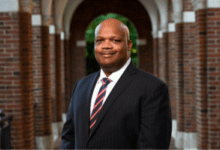
COMMENTARY: Student Loan Debt Is Too Damn High, Rashid Davis may have the Answer!
By Curtis Valentine
Student loan debt is too damn high, African American college graduates owe an average of $25,000 more in student loan debt than White college graduates. Unfortunately, President Biden’s student loan forgiveness plan, while providing some immediate relief, won’t change that for current and future students. In fact it may make it worse. But a solution to lower the cost of a postsecondary degree for millions of African-Americans may be hiding in plain sight. Ever heard of the P-TECH model?
The innovative Pathways in Technology Early College High School or P-TECH is an early college model that spans grades 9 – 14. This public education reform model focuses not only on college preparation but also on career learning and readiness. P-TECH students earn both a high school diploma and at no-cost, college credits that can accumulate to a two-year postsecondary degree in a STEM field.
As in all things, race matters. As of 2017, almost 40% of white Americans over 25 years old have at least an associate’s degree. The same is true for only 17% of Latinos and 35% of African-Americans. PTECH – serving predominantly low-income Africa-American and Latino students – gets to the heart of the matter.
You can’t say P-TECH without saying Rashid David, arguably the father of the school model that is changing the career trajectory and life outcomes for low-income and minority students in 300 schools in 26 countries around the world.
The more you learn about Rashid, the more you’ll realize he was born to do what he does. Long before becoming the Founding Principal of the first P-TECH school and the first public school leader to have his school referenced in a Presidential State of the Union, Rashid Davis came from humble beginnings.
An only child born in the Bronx, NY to teenage parents from rural South Carolina, Rashid split time between the big city and the backwoods of Ridgeland, SC. The back and forth between two worlds resulted in a greater appreciation for both, but also came with what experts used to call learning loss, or now refer to as interrupted learning. In Rashid’s case, the time spent in transition led to interruptions or stoppages in educational instruction.
The COVID pandemic brought to light the impact of stoppages in educational instruction like never before. And long before terms like learning loss and interrupted learning became a part of the lexicon of everyday Americans, P-TECH was building it into their model. According to Rashid, “Supportive pathways help with attendance, persistence, and retention.”
For Rashid, the most valuable ingredient in addressing educational inequities is time and to him traditionally schools don’t use it well. When asked what traditional school systems lack, Rashid says “Structure! Our timing is based on research. How do you structure time for the longer school day and longer year to close the gap between the intra-racial gap between low income students and high income students?”
While a career in education was never originally in Rashid’s plans, exposure to a number of Black men in education planted a seed that would blossom much later. As a high schooler, Rashid saw Black men as teachers, principals, school board members, and school counselors. Rashid does not mince words when discussing the impact of Black educators on his life, “Educators were my village. All I saw was Black excellence.”
The village grew when Rashid moved to Atlanta to enroll in Morehouse College. At Morehouse students are challenged to not merely exist, but to serve. An aspiring lawyer, Rashid says “I never wanted to be an educator, I just wanted to help people.” Having to serve in the Air Force Reserves to help pay for Morehouse, the cost of college was always top of mind for Rashid…and still is.
To address issues of cost, P-TECH models provide students a no-cost associate’s degree, and through this exposure a path to a career in Science, Technology, Engineering, and Math (STEM). Each P-TECH school is different but in Rashid’s case, his students benefit from the presence of both an industry and college liaison from IBM and the City University of New York in the building everyday. The college partner ensures students are registering for the proper courses, and IBM liaison ensures the courses are preparing students for careers in their company.
While dual enrollment – high school students taking college courses – is growing nationally, P-TECH students exceed the national average of dual enrollment students by year 4 of their program. The success of P-TECH is in spite of the fact that, unlike many specialty high schools, the program does not have an entry exam or enroll students based on past academic performance.
The traditional model of limiting the power of school leaders to be autonomous leaders who make individual decisions about how time is used, who to hire, or who to enroll is antiquated. To address the impact of post-COVID interrupted learning or the cost of college tuition, leaders need to be bold and policy makers need courage to challenge traditions. According to our research at the Progressive Policy Institute, schools and school districts that provide school leaders more autonomy, in return for more accountability, make the greatest gains in student achievement for low-income and minority students.
Since 2011, Rashid has been challenging tradition just like his grandparents. Rashid says, “My grandparents only had a middle school education but they were landowners. Our Black & Brown students need honesty. They need leaders unashamed to tell them that the system is built on institutionalized racism. Students need leaders unapologetic about history.”
Rashid is unapologetic about ensuring Black & Brown students succeed. In many ways, his success is just as unlikely as his students. In 2017, only a quarter of 9th graders in New York City Public Schools earned a college degree. On the other hand, more than half of his first cohort of P-TECH students beginning in 2011 earned a college degree.
I believe in the P-TECH model so much, as a School Board Member I voted to approve one in my own district and this fall my son will be attending the school. In four years my son will graduate with a high school diploma, a no-cost associate’s degree, and none of the student debt my wife and I are still repaying. In many ways, my son is Rashid’s wildest dream…and mine too!
Curtis Valentine is Co-Director of the Reinventing America’s School Project with the Progressive Policy Institute and an At-Large Member of the Prince George’s County (MD) Board of Education.










